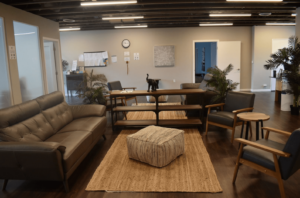When someone you love is struggling with both addiction and mental health issues—known as co-occurring disorders or dual diagnosis—the journey can feel overwhelming for the entire family. According to the Substance Abuse and Mental Health Services Administration (SAMHSA), approximately 21.5 million adults in the United States have co-occurring disorders, meaning millions of families are navigating these complex challenges together.
As a family member, you play a crucial role in your loved one’s recovery, but supporting someone with dual diagnosis requires understanding, patience, and specific strategies. This guide will help you learn how to provide effective support while maintaining your own well-being throughout the recovery process.
Understanding Co-Occurring Disorders
Co-occurring disorders involve the presence of both a substance use disorder and a mental health condition that exist simultaneously. These conditions often influence and worsen each other, creating a complex web of symptoms that can be challenging to untangle. The National Institute on Drug Abuse (NIDA) reports that 35% of adults with another mental disorder also have a substance use disorder.
Common combinations include:
- Depression and alcohol use disorder
- Anxiety disorders and prescription drug abuse
- PTSD and various substance dependencies
- Bipolar disorder and stimulant abuse
- Schizophrenia and multiple substance use
Understanding that these conditions are interconnected—not separate issues—is the first step in providing effective support. Your loved one isn’t choosing to use substances despite having mental health issues; rather, they may be attempting to self-medicate or cope with overwhelming symptoms.
Recognizing the Signs and Symptoms
Identifying co-occurring disorders can be challenging because symptoms often overlap and mask each other. Being aware of warning signs can help you recognize when professional intervention is needed.
Mental Health Warning Signs:
- Persistent sadness, hopelessness, or mood swings
- Extreme anxiety, panic attacks, or excessive worry
- Withdrawal from family, friends, and previously enjoyed activities
- Changes in sleep patterns (insomnia or excessive sleeping)
- Difficulty concentrating or making decisions
- Thoughts of self-harm or suicide
Substance Use Warning Signs:
- Increased tolerance (needing more of the substance to achieve the same effect)
- Withdrawal symptoms when not using
- Neglecting responsibilities at work, school, or home
- Continued use despite negative consequences
- Secretive behavior or lying about substance use
- Physical changes such as weight loss, poor hygiene, or bloodshot eyes
Combined Warning Signs:
- Using substances to cope with mental health symptoms
- Worsening mental health symptoms during periods of heavy substance use
- Difficulty maintaining relationships due to both conditions
- Legal, financial, or health problems related to both issues
If you notice multiple signs from these categories, it’s important to encourage your loved one to seek professional help from providers experienced in treating co-occurring disorders.
The Importance of Family Support in Recovery
Research consistently shows that family support significantly improves treatment outcomes for individuals with co-occurring disorders. A strong, understanding family network can provide:
- Emotional stability during the ups and downs of recovery
- Practical assistance with daily responsibilities and treatment adherence
- Accountability in maintaining sobriety and mental health treatment
- Motivation to continue treatment during difficult periods
- Early intervention when warning signs of relapse appear
At Tres Vistas Recovery, our Family Therapy program recognizes that recovery is a collaborative journey. We work with families to improve communication, rebuild trust, and create a supportive home environment that fosters healing.
How to Communicate Effectively
Communication is often strained in families affected by co-occurring disorders. Learning how to communicate effectively can strengthen relationships and support recovery.
Do’s for Effective Communication:
Use “I” Statements: Express your feelings without blame. Say “I feel worried when you miss therapy appointments” instead of “You never follow through with treatment.”
Listen Without Judgment: Allow your loved one to express their feelings and experiences without immediately offering solutions or criticism.
Validate Their Struggles: Acknowledge that managing both addiction and mental health issues is challenging. Say something like, “I can see how hard you’re working to manage both conditions.”
Set Clear Boundaries: Communicate your limits clearly and kindly. “I love you, but I can’t give you money when you’re actively using substances.”
Focus on Specific Behaviors: Address concrete actions rather than character traits. “When you stay out all night without calling, I worry about your safety” instead of “You’re irresponsible.”
Express Hope and Support: Regularly remind your loved one that you believe in their ability to recover and that you’re there to support their journey.
Don’ts to Avoid:
Don’t Enable: Avoid making excuses for their behavior, providing money that might be used for substances, or covering up the consequences of their actions.
Don’t Lecture or Preach: Long speeches about the dangers of addiction or the importance of mental health treatment are rarely effective and can damage relationships.
Don’t Take Things Personally: Recognize that hurtful words or actions often stem from their conditions, not their true feelings about you.
Don’t Try to Control: You cannot force someone into recovery, but you can control your own responses and boundaries.
Don’t Ignore Your Own Needs: Focusing solely on your loved one’s problems while neglecting your own well-being is unsustainable and unhelpful.
Supporting Treatment and Recovery
Active participation in your loved one’s treatment process can significantly improve outcomes. Here’s how you can provide meaningful support:
Understanding Treatment Options
Familiarize yourself with different levels of care available for co-occurring disorders. At Tres Vistas Recovery, we offer multiple treatment options designed to meet varying needs:
- Intensive Outpatient Program (IOP): Provides structured treatment while allowing your loved one to maintain work, school, or family responsibilities
- Partial Hospitalization Program (PHP): Offers more intensive support with daily treatment sessions while allowing them to return home each evening
- Individual Therapy: Addresses personal issues and develops coping strategies specific to their unique situation
- Medication-Assisted Treatment (MAT): Combines medication with counseling to treat both addiction and mental health symptoms
Encouraging Treatment Participation
Research Treatment Options Together: Help your loved one explore different programs and providers, emphasizing those with experience in dual diagnosis treatment.
Offer Transportation: Providing rides to appointments removes barriers and shows your commitment to their recovery.
Attend Family Sessions: Participate in family therapy or educational sessions when invited. This demonstrates your support and helps you learn valuable skills.
Celebrate Progress: Acknowledge milestones, both big and small. Completing a week of treatment, attending a support group meeting, or taking medication consistently are all worth recognizing.
Prepare for Setbacks: Understand that recovery is rarely linear. Having a plan for how to respond to relapses or mental health crises can help everyone navigate difficult periods.
Creating a Supportive Home Environment
Remove Triggers: Eliminate alcohol, drugs, and drug paraphernalia from your home. Also consider removing items that might trigger mental health symptoms.
Establish Routines: Consistent daily schedules can provide stability and structure that supports both mental health and recovery.
Encourage Healthy Activities: Suggest activities that promote physical and mental wellness, such as exercise, meditation, or hobbies that don’t involve substance use.
Monitor Medication: If appropriate and with their consent, help ensure they’re taking prescribed medications consistently and as directed.
Build Social Connections: Encourage relationships with sober, supportive friends and participation in recovery communities or mental health support groups.
Setting Healthy Boundaries
Setting boundaries is crucial for both your well-being and your loved one’s recovery. Boundaries are not punishments; they’re guidelines that protect relationships and promote healthy behaviors.
Financial Boundaries
- Don’t provide money that could be used for substances
- Consider helping with treatment costs instead of general financial support
- Require accountability for how money is spent
- Help them develop budgeting skills for managing their own finances
Behavioral Boundaries
- Don’t allow substance use in your home
- Require respect for household rules and other family members
- Set consequences for aggressive or threatening behavior
- Maintain your own social activities and relationships
Communication Boundaries
- Don’t engage in arguments when they’re under the influence
- Limit discussions about their problems if they dominate every conversation
- Set specific times for serious conversations about their recovery
- Refuse to be manipulated through guilt or threats
Emotional Boundaries
- Don’t take responsibility for their emotions or choices
- Maintain your own interests and relationships
- Set limits on crisis calls or dramatic situations
- Recognize that you can offer support without fixing their problems
Remember, boundaries should be communicated clearly, enforced consistently, and adjusted as your loved one progresses in recovery.
Taking Care of Yourself
Supporting someone with co-occurring disorders can be emotionally, physically, and financially draining. Taking care of your own well-being is not selfish—it’s essential for providing sustainable support.
Signs You Need to Focus on Self-Care
- Feeling constantly worried, anxious, or depressed
- Experiencing physical symptoms like headaches, sleep problems, or changes in appetite
- Isolating yourself from friends and activities you enjoy
- Feeling resentful toward your loved one or their condition
- Having difficulty concentrating on work or other responsibilities
- Experiencing financial strain due to their addiction or treatment costs
Self-Care Strategies
Seek Your Own Support: Consider individual therapy, support groups for families of people with addiction or mental illness, or counseling to process your own emotions and experiences.
Maintain Your Relationships: Don’t let your loved one’s condition consume all your time and energy. Nurture relationships with friends and other family members.
Practice Stress Management: Develop healthy coping strategies such as exercise, meditation, journaling, or hobbies that bring you joy.
Set Realistic Expectations: Accept that recovery is a long process with setbacks. You cannot control their choices, but you can control your responses.
Educate Yourself: Learn about co-occurring disorders through reputable sources. Understanding the conditions can reduce fear and help you respond more effectively.
Consider Respite: It’s okay to take breaks from caregiving responsibilities. Ask other family members or friends to help, or arrange for temporary alternative care when needed.
Resources for Families
Numerous resources are available to help families navigate co-occurring disorders:
National Organizations and Helplines
- SAMHSA National Helpline: 1-800-662-HELP (4357) provides 24/7 treatment referral and information services for families facing mental health and substance use disorders
- National Alliance on Mental Illness (NAMI): Offers family support groups, educational programs, and advocacy resources
- 988 Suicide & Crisis Lifeline: Call or text 988 for immediate crisis support
Educational Resources
- National Institute of Mental Health (NIMH): Provides comprehensive information about substance use and mental health disorders
- SAMHSA’s Co-Occurring Disorders Resources: Offers guidance on managing life with co-occurring disorders
Local Support Options
Many communities offer family support groups, educational workshops, and counseling services specifically for families affected by addiction and mental illness. Contact your local mental health center or community health organization to learn about resources in your area.
When to Seek Professional Help
While family support is crucial, professional intervention is often necessary for effective treatment of co-occurring disorders. Consider encouraging professional help when:
- Your loved one expresses thoughts of self-harm or suicide
- Their substance use or mental health symptoms are worsening despite family support
- They’re experiencing legal, financial, or relationship consequences due to their conditions
- Family relationships are severely strained or becoming unsafe
- Previous attempts at self-directed recovery have been unsuccessful
At Tres Vistas Recovery, we understand that families need support too. Our comprehensive treatment approach includes family education and therapy to help everyone involved in the recovery process.
Creating a Long-Term Support Plan
Recovery from co-occurring disorders is typically a long-term process that requires ongoing support. Work with your loved one and their treatment team to develop a comprehensive support plan that includes:
Crisis Management
- Emergency contact numbers for mental health and addiction crises
- Clear steps to take during a mental health emergency or substance use relapse
- Advance directives for mental health treatment if your loved one becomes unable to make decisions
Ongoing Treatment Support
- Regular check-ins about their treatment progress and needs
- Plans for handling insurance issues or treatment transitions
- Backup options if their primary treatment provider becomes unavailable
Family Communication
- Regular family meetings to discuss progress and concerns
- Agreements about privacy and information sharing
- Plans for involving extended family members or friends in support efforts
Relapse Prevention
- Recognition of early warning signs for both mental health episodes and substance use
- Specific actions each family member will take if warning signs appear
- Strategies for maintaining hope and motivation during difficult periods
Hope and Recovery
While co-occurring disorders present complex challenges, recovery is absolutely possible with the right treatment and support. Research from SAMHSA shows that integrated treatment addressing both conditions simultaneously leads to better outcomes than treating each condition separately.
Many individuals with co-occurring disorders go on to live fulfilling, productive lives in recovery. With proper treatment, family support, and personal commitment, your loved one can learn to manage both their addiction and mental health condition effectively.
Remember that recovery is not a destination but an ongoing journey. There will be setbacks and challenges, but with persistence, professional help, and family support, lasting recovery is achievable.
Moving Forward Together
Supporting a loved one with co-occurring disorders requires patience, understanding, and a commitment to your own well-being. By learning about their conditions, communicating effectively, setting healthy boundaries, and taking care of yourself, you can provide meaningful support while maintaining your own mental health.
Remember that you are not responsible for your loved one’s recovery, but your support can make a significant difference in their journey. Focus on what you can control—your own actions, responses, and self-care—while offering love and encouragement for their efforts to heal.
The path may be challenging, but with professional treatment, family support, and personal determination, individuals with co-occurring disorders can achieve lasting recovery and improved quality of life. Your role as a supportive family member is invaluable in this process.
If you’re ready to learn more about how to support your loved one’s recovery, contact Tres Vistas Recovery today. Our experienced team specializes in treating co-occurring disorders and can provide the guidance and resources your family needs to navigate this journey together.
For immediate help or crisis support, don’t hesitate to call SAMHSA’s National Helpline at 1-800-662-HELP (4357) or text 988 for the Suicide & Crisis Lifeline. Help is available, and recovery is possible.

Tracey Kane is a Marriage and Family Therapist (LMFT) and Assistant Clinical Director at Tres Vistas Recovery. With over 11 years of experience in the field of addiction treatment, Tracey has dedicated her career to helping individuals struggling with substance abuse and mental health issues.














